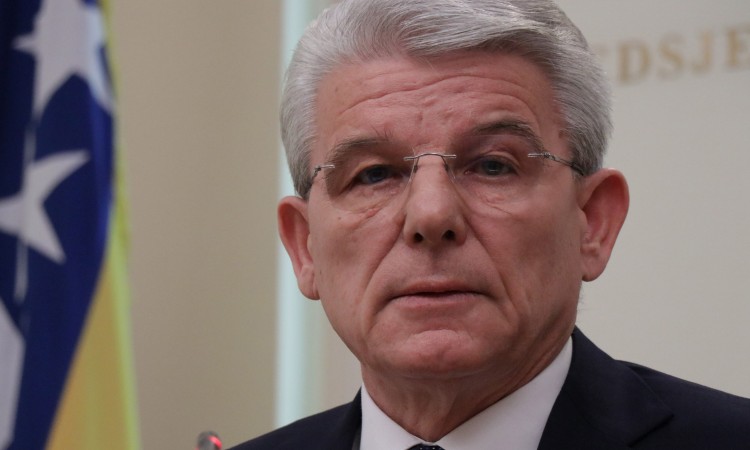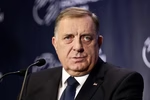
The European Union will only be completed once the countries of the Western Balkans become its members, the Bosniak member of Bosnia’s tripartite Presidency, Sefik Dzaferovic, said at the meeting of leaders of the Brdo - Brijuni Process in Slovenia on Monday.
"The accelerated accession of all Western Balkan countries to the EU should primarily be seen by the European Union as its geopolitical and geostrategic interest. The EU can be complete only when all the countries of the Western Balkans become its members because that guarantees the security and prosperity of both the EU and the Western Balkans," Dzaferovic said.
He noted that the Brdo Brijuni process was established as an important platform for regional cooperation and dialogue, which aims to resolve open issues and improve relations, and that it is important to promote the European perspective of the Western Balkans.
Dzagferovic argued, however, that the achieved level of regional dialogue and cooperation is not yet at the desired level, but that it helped to overcome certain problems or at least to initiate a dialogue on solutions, and most of the good things that have happened in the region are the result of European integration.
"Bosnia and Herzegovina wants good relations with all countries in this region, as well as good relations with its neighbours. We want cooperation, fair and friendly relations, which will be based on the principle of mutual respect and reciprocity. We ask for all open issues to be resolved through dialogue and agreement, and if an agreement is not possible, then with the participation of institutions of international law,” he said, emphasising that “there are open issues and unresolved relations between Bosnia and Herzegovina and its neighbours, which need to be resolved.”
BiH and Serbia have not concluded a border agreement because Serbia insists on a previous exchange of territories, which BiH does not want to agree to, he noted. In addition, Dzaferovic stated that the issue of the attitude towards the past also burdens relations between the two countries, arguing that the institutions of Serbia do not respect and openly deny the verdicts of the International Court of Justice and the Hague Tribunal.
"In this regard, relations are disrupted by the fact that a large number of war crimes suspects, including those charged with participating in the Srebrenica genocide, are hiding in Serbia. Unfortunately, the judicial auhorities there show no interest in extraditing or prosecuting them," he said.
There are also numerous open issues between Serbia and BiH concerning property and succession (after the dissolution of former Yugoslavia) that need to be resolved,” he said.
Dzaferovic noted that Bosnia’s hydro potential is being used without an agreement with the state of BiH or compensation, arguing tht the latest example of this is the announced construction of the Buk Bijela hydropower plant on the river Drina which is the border between the two countries.
Bosnia also has open border issues with Croatia, he said, noting that although an Agreement on Borders was signed between the two countries, it was never ratified.
He complained that Croatia is building the Peljesac Bridge across Bosnian waters and is thus violating Bosnia’s rights according to international law.
Another problem is Croatia’s planned construction of a dump site for nuclear waste at Trgovska Gora, near the Bosnian border, as well as Croatia installing gas pipes along the Sava river without the consent of BiH.
He listed Croatia’s rejection of rulings by the International Criminal Tribunal for the Former Yugoslavia (ICTY), which found that Croatian wartime leadership was involved in a “joint criminal enterprise” in Bosnia as another problem for the relations between the two countries. This, he argued, “insults victims and brings mistrust.”
Despite open issues, significant bilateral cooperation between BiH and Serbia and Croatia has been achieved through visits at the highest level, although a new problem has arisen in this area in the past two years, namely, the practice of bypassing the BiH Presidency as the only collective head of state represents BiH, he said.
Dzaferovic praised the vaccine donations to Bosnia from Serbia, Slovenia and Croatia as positive developments, adding that Bosnia also sent teams of doctors to Serbia to help the country respond to the pandemic.
The European Union represents a framework for security and prosperity in Bosnia, he said.
"Our goal in Bosnia and Herzegovina is to adopt European norms, whether it is changes to the Constitution, the Election Law or other necessary reforms that are before BiH in order to become a functional part of the European system," he said.
“The future of BiH is in building a functional, complete and democratic state, a member of the EU and NATO, in which every person will feel comfortable and have equal rights on every inch of this country,” he concluded.
Kakvo je tvoje mišljenje o ovome?
Učestvuj u diskusiji ili pročitaj komentare





 Srbija
Srbija
 Hrvatska
Hrvatska
 Slovenija
Slovenija



























































